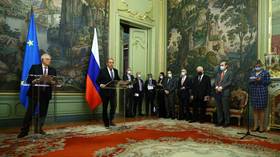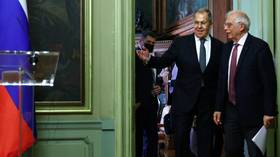Karin Kneissl: From ‘megaphone diplomacy’ to aphasia: The deep disconnect between the EU and Russia

The recent visit to Moscow by EU High Representative Josep Borrell has put on display the Union’s flawed approach to Russia: a combination of loud condemnations and a pathological inability to conduct proper diplomacy.
In a tweet last Saturday, EU High Representative for Foreign Affairs and Security Policy Josep Borrell gave an account of his recent talks in Moscow. He noted that he and his Russian counterpart had agreed to tackle “global issues such as climate change and the Covid-19 pandemic.” In addition, there was willingness on both sides to cooperate in the Middle East. In reality, however, the state of bilateral relations – specifically, the level of political dialogue and trade relations – between Brussels and Moscow has been quite underwhelming ever since 2014, with the escalation of sanctions and counter-sanctions.
This was the first visit in three years by the high representative for foreign affairs and security Policy, who is, technically, the closest the EU has to a minister of foreign affairs. Josep Borrell took this position in December 2019, succeeding Federica Mogherini. Before becoming the EU's foreign policy chief, Borrell held the position of Spain's foreign minister for less than two years. In Moscow, he faced Sergey Lavrov, a master of diplomacy with decades of experience, who feels quite at home in world politics – whether he is dealing with international issues domestically, at the UN, or as the veteran minister for foreign affairs of Russia who had met many of Borrell's predecessors.
Also on rt.com After backlash from hawks over cordial scenes in Moscow, EU’s foreign envoy backtracks, slamming Russia just days after visitWhen conversation is reduced to reading out pre-approved talking points
At the meeting, Borrell delivered a list of “talking points” he brought with him, which is a series of pre-approved and widely known positions held by the 27 EU countries on the numerous issues plaguing Russia-EU relations. The list is long, and the problems outlined in it cause a lot of disagreement between Brussels and Moscow. They range from the figure of Alexey Navalny and the recent court ruling, to alleged attacks using toxic substances (see the March 2018 case of double agent Sergei Skripal and his daughter), to the conflict in eastern Ukraine and the Crimea crisis in 2014. Another issue on the list is the construction of the Nord Stream 2 gas pipeline in the Baltic Sea, a subject that has, since August 2020, produced a wide range of reactions from different EU politicians. The Russian-German project was green-lit back in 2005, and the additional lines are seen as a way to expand and improve on the original Nord Stream pipeline. Berlin views the project as critical and is reluctant to tie it to Navalny's case.
These “talking points” are the lowest common denominator that Borrell can agree on with the EU member states. After all, the positions of the 27 EU countries vary to a considerable degree in the way they build bilateral ties with Russia. Berlin, Rome, and Paris have traditionally maintained active conversation, which is reflected in different formats of structured dialogue. Berlin and Moscow use the St. Petersburg Dialogue forum as a platform for conversation, while the French-Russian version of the same is called the Trianon Dialogue. In May 2019, Vienna and Moscow launched the Sochi Dialogue, initiated by the presidents of both Russia and Austria. Rome wants to step up efforts to create a similar bilateral forum with Moscow.
For historical reasons, the Baltic states, as well as Poland, prioritize their transatlantic commitments above all else – whereas other countries of the former Council for Mutual Economic Assistance (COMECON) feel more at ease in their relations with Russia. While memories of the brutal suppression of the 1956 uprising by the Red Army (as well as the West's ‘betrayal’) persist in Hungary even today, Prime Minister Viktor Orban's predecessors have always spoken to Moscow on even terms. The latest example is Hungary ordering a batch of Russia's Sputnik V vaccine a few months ago. The Hungarian government was scolded in Brussels for this transgression, which was seen as a departure from a strictly “European solution” to the pandemic. With the recent failure of the European Commission to coordinate vaccination efforts across the EU, the call to secure bilateral deals is becoming more and more urgent.
It is worth noting that Borrell commended Russia and its vaccine for contributing to the fight against the Covid-19 pandemic. Hence, the idea of purchasing the Russian-made vaccine was approved by the EU, and it was one of the talking points in Borrell's speech, in addition to the voices opposing this decision. This was, without doubt, a risky balancing act for Borrel who, while an experienced politician, does not have a long record of international meetings of this caliber. It is difficult for him to keep up with Lavrov, and, apparently, he does not have the full support of all 27 EU capitals. In order to be an EU high representative, one must possess special talents. One of them is the ability to develop constructive relations with your counterpart while respecting the interests of everyone involved. Former European Commission President Jean-Claude Juncker managed this with both Donald Trump and Xi Jinping. Lavrov was uncompromisingly clear in his diagnosis of Russia-EU relations, describing Europe as an “unreliable partner.” On his part, Lavrov also presented a list of items on the agenda that, from Russia's point of view, have marred relations between the two parties in recent years.
Expulsion of diplomats
During the talks, Lavrov also informed the EU delegation about the imminent expulsion of three diplomats who, according to Russia's foreign minister, had participated in unauthorized rallies in support of Navalny. While Russia's Foreign Ministry regarded the actions of the diplomats as a violation of the Vienna Convention on Diplomatic Relations, German Foreign Minister Heiko Maas said they only wanted to get a better idea of the protests taking place, and were there for that purpose only.
I was working as a diplomat in 1990-1998, and I do not recall a single time we would be asked to go to the streets and to get an idea about any protests. Moreover, as foreign minister I would never instruct embassies to do something like that. With good contacts and easy access to civil society, you can get a decent grasp on the domestic situation in the country you’re stationed in and relay it to your supervisors so that your government can come up with potential responses. If we’re talking about protecting people, consular protection is only provided to the nationals of your own country. However, for the EU it’s now become par for the course to send their observers to court hearings that have nothing to do with EU citizens. That’s what happened in Navalny’s case as well. Curiously enough, there are no observers for court proceedings involving whistleblower Julian Assange, who is currently in a UK prison. But that’s another story.
Expelling diplomats is always a sign of a serious deterioration in bilateral relations. In 2018, 17 EU countries expelled Russian diplomats after the Skripal incident. I opposed this. When relations are strained, it's crucial to keep all diplomatic channels open. However, several months ago Austria made the same move, citing an old charge of espionage against the diplomat in question.
If we try to capture the essence of diplomacy through a mathematical formula, it would be “diplomacy equals continuing a respectful dialogue under any circumstances.” But for many years now, what we have seen in Russia-EU relations is a kind of aphasia – a pathological inability to communicate. That’s how I would frame the current situation. In recent years, Sergey Lavrov has repeatedly criticized Europe for its “megaphone diplomacy,” i.e. overwhelming rhetoric in mass media.
Tactfulness, respect, and trust are the pillars of diplomacy, and they are conspicuously absent in the relations between Russia and the EU. It is with profound regret that I watch our relations deteriorate when things could be so different, especially with the pandemic basically forcing us to work together.
Think your friends would be interested? Share this story!
The statements, views and opinions expressed in this column are solely those of the author and do not necessarily represent those of RT.













